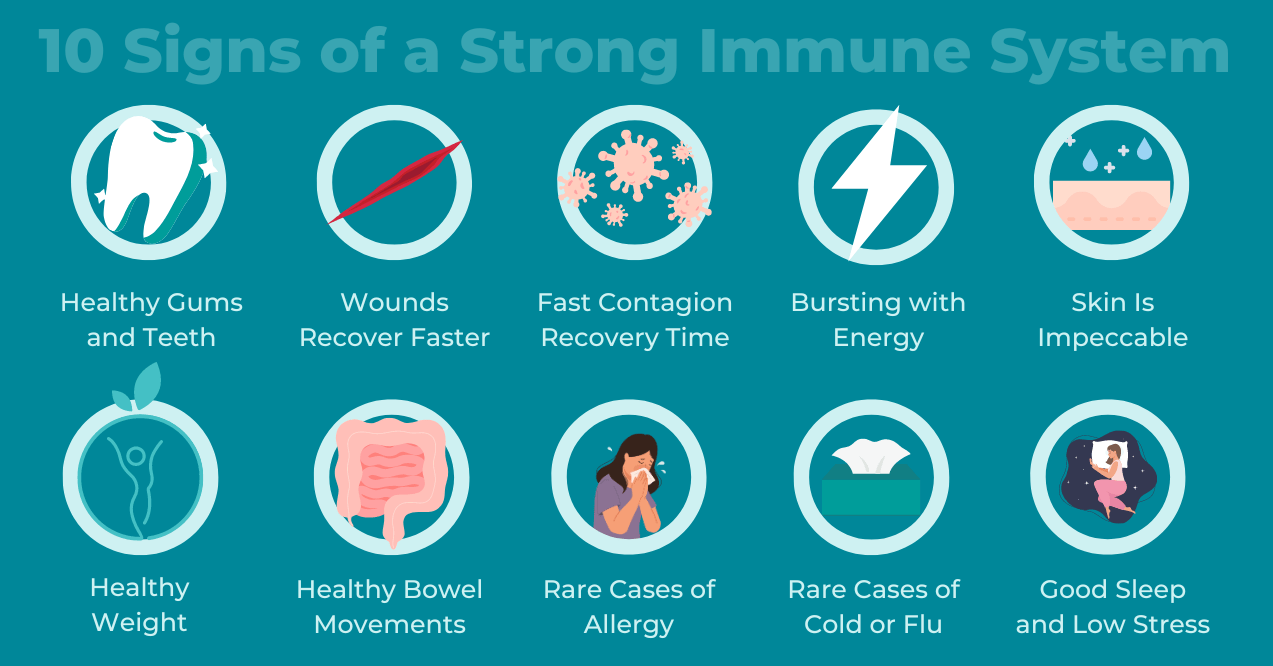10 Signs of a Strong Immune System
Medically reviewed by our experts


With the signs of a strong immune system, you can surely beat illnesses and pathogens effectively. Without this handy protective shield, even the slightest presence of bacteria and fungi could lead to adverse health consequences—and possibly even death.
The body’s defense mechanism is remarkable in protecting against harmful invaders, which helps to prevent the most common ailments. It comprises an intricate system of organs, cells, and proteins that work tirelessly to eliminate pathogens such as viruses, bacteria, fungi, protozoa, and toxins (chemicals made by microbes).
If you’re prone to illness, you are likely to have a weak immune system. But don’t worry You can do numerous things to support your body’s natural protection. Let’s explore the immune system and learn how to know if your immune system is strong to help evaluate yourself.
The Innate and Adaptive Immune Systems
As mentioned above, your immune system is a fascinating and intricate network of organs, cells and proteins that defend your body from harmful pathogens. These specialized components work together to identify and eliminate any foreign substances in your body. The immune system uses various mechanisms to reach its goals.
Before it can protect you, your immune system needs to identify your body cells so that it doesn’t end up attacking them. Then, it can recognize and fight harmful identities such as fungi, viruses, and bacteria, as well as other foreign bodies. Your immune cells have receptors that detect unique markers on these threatening pathogens to trigger a proper immune response.
The immune system’s defense mechanism is divided into two categories:
Innate System
Innate immunity is the first line of defense. It acts as a rapid and nonspecific mechanism that prevents attackers from proceeding to invade the body. The innate immune system consists of:
- Physical Components – Including mucous membrane and skin.
- Cellular Components – Comprising the natural killer cells and phagocytes
These components are always on guard, which enables them to detect and eliminate potential threats. With all of them working in synergy, you can rest assured your health will remain in top condition at all times.
Adaptive System
Adaptive immunity depends on a more refined system that starts working when innate immunity is insufficient. It relies on specialized defense cells such as B cells and T cells, all of which are able to detect specific antigens that come with the pathogens. Once activated, these cells coordinate a targeted attack, neutralizing the threat and establishing an immunological memory for future encounters.
Both systems work hand in hand to ensure that your body remains healthy despite the high number of potential threats. You should get regular checkups to ensure both systems are working correctly.
Sings of a Strong Immune System
Many people wonder, “How do I know if my immune system is strong?” Fortunately, there are several signs a healthy immune system shows in the body that point to a better ability to fight diseases. It is crucial to learn about these signals and find ways to deal with any issues that impact them.
If you are experiencing symptoms that do not align with good health, it is possible that your immunity is low, and you should address the underlying issues. The good news is that many of these issues can be resolved through changes in your lifestyle. Below, you’ll find the 10 vital signs of a strong immune system.

1. Healthy Gums and Teeth
Your overall oral health influences the strength of your immune system. Maintaining good oral hygiene leads to a strong immune response. However, most oral infections, including periodontal disease, dental caries, and gum issues, weaken the body’s immunity. Therefore, people with untreated gum problems may suffer from other conditions due to their weakened immunity.
There are several practices you should consider to enhance your oral health. They include avoiding tobacco products, regular brushing and flossing, and having dental checkups at least twice a year to help deal with said issues before they become more problematic. You should also cut down on sugary foods or biting on hard things like ice to avoid cavities and broken teeth.
By taking care of your oral health, you can increase the good immune system signs and enjoy a radiant smile. Remember, maintaining oral health involves regular hygiene practices and is not a one-off action.
2. Your Wounds Recover Faster
Did you know that the rate at which the body recovers from injuries can vary from person to person? Interestingly, the speed of this recovery process can be one of the signs of a strong immune system. A strong immune response can resolve an injury more effectively, promoting tissue repair at all stages of the recovery process. As a result, your body can repair wounds much faster.
Other factors that enhance the speed of wound recovery include an adequate flow of blood to the area of injury, the production of growth factors, and improved immune cell activity. However, the extent of the wound may also affect its recovery speed. If your wounds take too long to resolve, you should help your body with proper nutrition, regular exercise, and a generally healthy lifestyle.
If your wounds do not improve for several weeks or become irritated, red, and swollen, it is crucial to seek prompt medical attention. A doctor can prescribe the appropriate medication to accelerate the process of cell repair.
3. Fast Contagion Recovery Time
Each day, your body faces numerous threats that may result in harmful pathogens. Luckily, your immune system is always ready to quickly and efficiently combat these invaders, ensuring your well-being. As previously stated, immune cells can swiftly detect harmful pathogens in your body and rapidly eradicate them, resulting in a shorter duration and less severe illness.
When pathogens persist for extended periods, particularly minor ones like those that cause colds and the flu, it could be a sign that your immunity is not strong enough. One possible reason for this lack of response could be that the immune system fails to identify harmful pathogens. Alternatively, it could be producing antibodies at a slower rate than necessary to fight off threats.
To maintain robust immunity, it is vital to lead a healthy lifestyle. You can start by eating a well-balanced diet, engaging in regular exercise, managing stress, and getting enough sleep. Conveniently enough, vaccinations can also significantly bolster your immune defenses against specific invaders.
4. You’re Bursting with Energy
When you are inflamed due to an injury or a pathogen, it is due to the immune system fighting the invading threats in the body. You may feel hot, exhausted, lethargic, or just in general discomfort. If you are experiencing chronic inflammation, your immune system may be using up a lot of energy. As a result, you may feel fatigued and find it difficult to perform your daily tasks comfortably.
However, when the immune system is strong, you’re less likely to suffer from excessive or chronic inflammation. Instead, your cells have the necessary energy production, and you are full of life. With this enhanced vigor, you breeze through tasks effortlessly and maintain a refreshing feeling throughout the day.
As mentioned earlier, you can maintain a healthy immune system and increase energy levels with a nutrient-rich diet, regular exercise, enough sleep, and effective stress management. By following these practices, you can alleviate the strain on your body, ultimately leading to reduced inflammation.
5. Your Skin Is Impeccable
Flawless skin often serves as a visible indicator of your overall health and can be a visible sign of a strong immune system. Being the largest organ in the body, the skin plays a crucial role in shielding us from potential threats such as harmful environmental factors and pathogens.
In addition, when the immune system is robust, it is able to effectively combat any potential invaders and maintain healthy skin. A strong immune system helps with quick wound repair, reducing the risk of scars and blemishes. It also regulates the production of sebum, the skin’s natural oil, which prevents excessive dryness or oiliness.
When your immune system works properly, it is better equipped to manage chronic skin conditions and eruptions, like acne and atopic dermatitis and reduce the potential for t flare-ups. It can also support the balance of gut microflora, maintaining skin integrity and reducing the likelihood of skin issues caused by inflammation in the digestive system.

6. Healthy Weight
Your weight plays a crucial role in enhancing your overall health and enabling the body to complete various functions effectively. When your body weight is either too low or too high, you may experience a weakened immune system and a higher risk of contracting opportunistic diseases.
Studies have associated carrying excess weight with low-grade chronic inflammation. The fatty layer produces adipocytokines that may promote this problem. Besides, being overweight also presents a risk factor for the flu as it impairs the function of the T cells. Additionally, heavier bodies tend to overwork the heart as it pumps blood across a larger area.
You can manage your weight by adopting a balanced diet, controlling your portions, and engaging in regular physical exercise to increase your metabolism. To maintain a healthy weight, it’s important to determine your daily calorie needs and plan your meals accordingly. Providing just the right amount of calories will prevent your body from storing excess food as fat.
7. Healthy Bowel Movements
There is a link between a healthy, happy gut and a robust immune system. Your digestive system hosts lots of microorganisms, collectively called the gut microbiome. They not only help with the digestion of food but also prevent other conditions, such as inflammatory bowel syndrome and chronic skin, nail, and joint conditions.
Symptoms of poor gut health include constipation, the presence of hemorrhoids, bloating, flatulence, and watery stools. These signs could indicate more severe conditions such as food intolerances and autoimmune disorders. Gut inflammation may also cause unhealthy bowel movements.
Regular bowel movements are signs healthy immune systems have. To improve yours, it is essential to adopt good gut practices. You can do this by incorporating more fiber and water into your meals. Doing so helps increase the variety of bacteria in your gut and promotes the smooth movement of food through your intestines. If you have a low count of helpful bacteria, probiotics can help.
8. Rare Cases of Allergy Symptoms
Some people have problems staying near or using generally harmless substances, such as certain foods, pollen, materials such as latex, and specific drugs. When this happens, their bodies overreact to these substances by producing antibodies, as they would in the presence of pathogens. These antibodies cause inflammation, which may present itself as:
- Blocked airways
- Swelling and bumps on the skin
- Itching
- Watery eyes
- Digestive problems
Struggling to work in certain environments and feeling drained can significantly impact your quality of life. Having a strong immune system can lead to fewer or no allergies because it can identify threats to the body accurately and is less likely to overreact. However, a problematic immune system will cause you to deal with several allergens that cause chronic inflammation. To address this issue and promote strong immune system signs, it’s crucial to maintain a healthy lifestyle and ensure you’re getting the proper nutrients.
9. Rare Cases of Cold or Flu
The common cold and flu are ailments caused by germs that spread rapidly during the cold season. People with strong immunity fend off these germs effectively, resulting in fewer cases of cold and flu. They either avoid contracting them altogether or have a shorter recovery time. They may also experience less severe symptoms compared to those with weaker immunity.
As previously mentioned, having a strong immune system can quickly detect the germ upon entering the body and produce antibodies to help prevent it from causing harm. This quick response decreases severity and shortens the time between contracting the contagion and recovering completely.
With rarely getting sick being one of the top healthy immune system signs, if you find yourself getting these infections regularly, it means that you need to work on your immunity. Dealing with colds and flu can be draining, causing fatigue and severe discomfort. It is essential to have a strong immune system to help combat these issues.
10. You Sleep Well and Have Low Stress Levels
Enough sleep and lower stress are undoubtedly signs of a healthy immune system. Additionally, they can also contribute to maintaining that strength. When you sleep, your body repairs cells and replenishes energy levels. If you get enough sleep, the immune system has ample time to recharge and get ready for the next day. As a result, it can also produce enough immune cells to fight invaders as soon as it detects them.
Stress causes the body to go on a fight or flight reaction, where cortisol levels are higher than normal. This hormone causes increased inflammation. Therefore, chronic stress is likely to put a strain on your immune system and increase your susceptibility to pathogens. Luckily, you can lower stress and sleep well by practicing relaxation techniques, mindfulness, and engaging in regular physical activity. Getting enough restful sleep and keeping stress levels low are crucial factors for maintaining a strong immune system and ensuring optimal functioning.
How Can You Further Boost the Immune System?
Genetics play a role in immune health. However, some lifestyle choices you make can damage or support your immune system. Consider making the relevant changes to your lifestyle to help support your immunity. Here is a quick look at some of the most effective strategies to support your immunity.
1. Take Care of Your Gut Microbiome
The gut microbiome consists of both good and bad bacteria. Maintaining the right balance of good bacteria is vital for your general digestion and overall health. An increase in the number of harmful bacteria can cause several ailments, including leaky gut and autoimmune conditions.
You can boost the numbers and quality of the good bacteria in your gut by eating a wide range of foods. Doing so will also help increase the microbiome’s diversity. Ensure that your diet is rich in fiber to enhance your digestion and support the movement of food in your gut. Fermented foods such as yogurt, kimchi, and kefir can become great allies in taking care of your gut microbiome.
2. Maintain a Healthy Weight
Being overweight is known to impair immune responses, making you susceptible to chronic diseases and pathogenic invasions. You can manage your weight by watching your portions, eating a balanced diet, and leading an active lifestyle. Consider talking to a dietician to help create a personalized diet plan for your specific needs.
3. Minimize Exposure to Environmental Toxins
Environmental toxins weaken your immune system. They put it under constant stress and stretch its capabilities. Toxins also affect how the body responds to threats because they affect the receptors on the immune cells. To steer clear of harmful substances and pollutants, avoid harsh chemicals, opt for organic produce, and quit smoking.
4. Social Connections
Having a supportive team that encourages you to live a healthy life is an excellent way to improve your immunity. Cultivate healthy relationships with people, engage in social activities, and seek emotional support where possible. Such connections help you live healthily and reduce stress, enhancing your immune system in the long run.
5. Take Dietary Supplements
You can further enhance your immune system by taking dietary supplements. Doing so help provide you with essential nutrients you’re not likely to find in the right quantities in your daily diet. A good example is our Nano-Powered Omega 3 by PureHealth Research, highly recommended by Dr. Holly Lucille, ND, a renowned naturopathic doctor. It’s one of the best supplements for immune system support, providing essential nutrients to help boost your body’s natural defenses.
The supplement contains a mix of:
- Omega-3 EPA – Also known as eicosapentaenoic acid, EPA helps in the production of signaling molecules called eicosanoids. These molecules help reduce immune markers and lower the risk for disease.
- Omega-3 DHA – Also known as docosahexaenoic acid, DHA supports heart function and support healthy blood sugar levels. This ingredient is one of the best supplements for dry eyes, brain, skin, nerves, and gums. It dampens overactive immune responses, which helps reduce swelling and chronic disease symptoms.
- Astaxanthin – This innovative component is an orange-to-pink carotenoid harvested from sea algae. It contains a powerful antioxidant that neutralizes free radicals in the body, thereby reducing organ-damaging oxidative stress, which may cause diseases.
The Nano-Powered Omega 3 uses nanotechnology to enhance the bioavailability and absorption of Omega-3 fatty acids. In essence, it helps get more omegas and antioxidants into your bloodstream and support immunity.
Provide your immune system with the essential nutrients it needs to thrive by incorporating Nano-Powered Omega 3 by PureHealth Research into your daily routine. Use it alongside a healthy diet and lifestyle to support your immunity. Ask your primary healthcare provider if this product is the right one for you.
Final Thoughts
How do you know if your immune system is working as it should? Signs you have a strong immune system vary, ranging from healthy skin, healthy gums, and wounds that recover quickly to rare cases of allergies and colds and the ability to fight invading pathogens, among others. It’s essential to understand how your immune system works and the factors that can impact its performance in order to maintain good health.
By identifying these issues, you can take steps to manage them effectively. To maintain a healthy lifestyle, you must have a balanced diet, stay active, and get enough quality sleep. It is also recommended to minimize your exposure to toxins in food and the environment and manage your weight.
If you’re ready to take your immune system to the next level, consider taking supplements such as Nano-Powered Omega 3. Check out our catalog for dozens of other products that will improve your quality of life and start your journey towards a better you today.
Immune system strength peaks in early adulthood.
While there’s no single test, doctors can assess your immune system through bloodwork and overall health evaluation.
Signs of a strong immune system include rarely getting sick, quick recovery from illness, healthy skin, good energy levels, and healthy gut.
Stress, poor diet, lack of sleep, smoking, excessive alcohol, and toxin exposure weaken the immune system.
Popular Articles
Advertisement. This site offers health, wellness, fitness and nutritional information and is designed for educational purposes only. You should not rely on this information as a substitute for, nor does it replace, professional medical advice, diagnosis, or treatment. If you have any concerns or questions about your health, you should always consult with a physician or other health-care professional. Do not disregard, avoid or delay obtaining medical or health related advice from your health-care professional because of something you may have read on this site. The use of any information provided on this site is solely at your own risk.
















